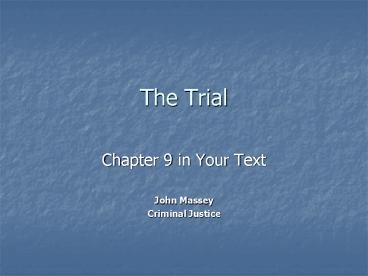The Trial PowerPoint PPT Presentation
1 / 12
Title: The Trial
1
The Trial
- Chapter 9 in Your Text
- John Massey
- Criminal Justice
2
After the arrest has been made
- The Initial Appearance
- Occurs after an arrest has been made
- -brief, informed of charges
- -given date for Preliminary hearing
- Do you release or detain?
- Bail
- Amount of money paid by defendant to court until
defendants return - A promise to return
- Reasonable
- Three Factors in Setting Bail
- Uncertainty
- Risk
- Overcrowded Jails
- Released on Recognizance
- Bail Bondsman
3
Preliminary Hearing Grand Jury
- Preliminary Hearing
- Defendant appears before the judge
- Is there sufficient evidence to proceed to trial?
- Some cases dropped
- Grand Jury
- Group of citizens
- Determine probable cause
- Federal Government and Some States
- Decides whether or not a case should continue
- Indictment (charge that probable cause does in
fact exist) - Factors to Consider When Deciding to Further
Prosecute - 1) Sufficient evidence?
- 2) Case priorities
- 3) Uncooperative victims
- 4) Unreliability of victims
- 5) Is defendant willing to testify against
others?
4
Pretrial Motions The Arraignment
- Defense can request specific actions
- 1) suppress evidence gained illegally
- 2) change of venue
- 3) invalidate a search warrant
- 4) obtain evidence that prosecution may be
withholding - 5) dismiss because of delay
- Arraignment
- Formal charge with crime stated in indictment
- Suspect enters plea (guilty, not guilty, nolo
contendre) - Plea Bargaining
- After arraignment, before trial begins
- Defense Prosecution agreement
- Most cases stop here
- Cuts down caseloads, saves time, moves process
along and efficient - Should be mutually beneficial
5
Unique Features of a Criminal Trial
- Speedy Trial
- 6th amendment
- Right to Jury Trial
- States decide (in misdemeanor cases)
- Sometimes bench trials
- Right Against Self-Incrimination
- 5th Amendment
- No person is required to be a witness against
him/herself - The Burden of Proof
- Beyond a reasonable doubt
- Guilt is clear and unquestionable
6
The Jury
- Jury Selection
- Citizen of the U.S.
- 18 up in age
- No felonies
- Pulled from community
- DMV lists, Voter Registration, Welfare Lists
- Voir Dire
- to tell the truth
- -jurors provide info, attorneys ask questions
- Screening process
- Preemptory challenges
- Each attorney allowed a certain number of
challenges - Can exclude jurors from serving w/out any
reason/cause - Some states 5 or 6 challenges, some as many as 10
- Virginia has 4
7
The Trial
- Opening Statement
- Both attorneys give general facts of the case
- Evidence
- Used to prove the existence or lack of a fact
- Three main types
- Direct witnessed by person giving testimony
- Circumstantial indirect, can create an
inference/likelihood - Relevant proves or disproves fact in question
(DNA/forensics) - Witnesses
- Two types
- Lay Witnesses turthfully and accurately testify
on a fact in question without an special training
or knowledge (ordinary witness) - Expert Witnesses witness with professional
training or experience in certain area
8
Witness Questioning
- Two types
- Direct Examination and Cross Examination
- Direct
- Prosecutor calls witness to stand to testify
- Questions that witness
- Cross
- Defense will question the prosecutions witness
- Hearsay
- Testimony given about a statement made by someone
else - Usually not admissible
- Defense is challenged with creating reasonable
doubt in order to get their clients found not
guilty
9
Later Stages of the Trial
- Defense closes case
- Prosecution can bring in new evidence (rebuttal
stage) - Defense has same opportunity
- Closing Arguments
- In most states, defense goes first, then
prosecution - Shifting the Power to the Jury
- Judge informs jury of charges/crimes and guides
them - Jury goes into deliberation, decides outcome
- Verdict issued by jury (usually guilty or not
guilty) - If unable to agree on unanimous verdict hung
jury
10
Appeals
- Appeals
- Defendant can appeal
- Higher court reviews lower courts decision
- Must question Constitutional issue or illegality
- Two Reasons for Appeals
- Correct error made in trial
- Review policy
- Double Jeopardy
- No individual should be tried twice for same
offense - Habeas Corpus
- you have the body
- Judicial order
- Writ of Habeas Corpus only Constitutional Issues
11
(No Transcript)
12
(No Transcript)

